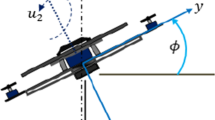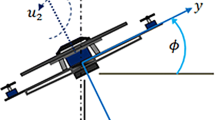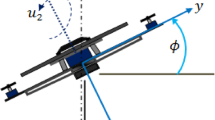Abstract
Unmanned aerial vehicle is an unmanned aircraft operated by radio remote control equipment and self-provided program control device. The flight control system is the core of the entire flight process of unmanned aerial vehicle to complete take-off, mission execution and recovery. The classical proportion integral differential controller is widely used in the modern control field because of its simple principle and flexible implementation. However, tuning proportion integral differential parameters depends on lots of experience. In this paper, a three-layer feedforward neural network is proposed and used to stabilize the unmanned aerial vehicle edge control system. A novel weight and structure determination method that incorporates bionic beetle swarm optimization algorithm, called beetle swarm optimization weight and structure determination algorithm, is proposed to train the three-layer neural network. Furthermore, the sigmoid activation functions are utilized in the beetle swarm optimization weight and structure determination algorithm to identify the ideal weight and structure of the neural network when dealing with fitting and validation. Then, other five algorithms are added for the comparative analysis, namely particle swarm optimization algorithm, genetic algorithm, bat algorithm, firefly algorithm and artificial bee colony algorithm. In this way, the performance improvement of the beetle swarm optimization algorithm can be highlighted. Finally, the application of unmanned aerial vehicle edge control is given by using two different control methods respectively, i.e., the proportion integral differential controller and the beetle swarm optimization weight and structure determination neural network. It can be seen from the results that the beetle swarm optimization weight and structure determination neural network can enable the unmanned aerial vehicle to better achieve trajectory tracking by showing a better performance on edge control.










Similar content being viewed by others
Explore related subjects
Discover the latest articles, news and stories from top researchers in related subjects.References
Keller J, Thakur D, Likhachev M et al (2016) Coordinated path planning for fixed-wing UAS conducting persistent surveillance missions. IEEE Trans Autom Sci Eng 14(1):17–24
Zuo Z, Mallikarjunan S (2016) \({\cal{L} } _ 1 \) adaptive backstepping for robust trajectory tracking of UAVs. IEEE Trans Ind Electron 64(4):2944–2954
Poksawat P, Wang L, Mohamed A (2017) Gain scheduled attitude control of fixed-wing UAV with automatic controller tuning. IEEE Trans Control Syst Technol 26(4):1192–1203
Yang C, Huang D, He W et al (2020) Neural control of robot manipulators with trajectory tracking constraints and input saturation. IEEE Trans Neural Netw Learn Syst 32(9):4231–4242
Tabish M, Kalam A, Zayegh A (2019) Robot DC servo motor parameters estimation in a closed loop using BAT optimisation algorithm. In: 2019 international conference on electrical, communication, and computer engineering (ICECCE). IEEE, pp. 1–5
Michael N, Mellinger D, Lindsey Q et al (2010) The grasp multiple micro-UAV testbed. IEEE Robot Autom Mag 17(3):56–65
He B, Li T, Xiao J (2021) Digital twin-driven controller tuning method for dynamics. J Comput Inf Sci Eng 21(3): 031010–031017
Fišer J, Zítek P (2019) PID controller tuning via dominant pole placement in comparison with Ziegler-Nichols tuning. IFAC-PapersOnLine 52(18):43–48
Sharma K, Palwalia DK (2017) A modified PID control with adaptive fuzzy controller applied to DC motor. In: 2017 international conference on information, communication, instrumentation and control (ICICIC). pp 1–6, IEEE
Xiao L, Zhang Y, Dai J et al (2019) New noise-tolerant ZNN models with predefined-time convergence for time-variant Sylvester equation solving. IEEE Trans Syst Man Cybern Syst 51(6):3629–3640
Schönfeld AB, Mund K, Yan G et al (2021) Corrections of photon beam profiles of small fields measured with ionization chambers using a three-layer neural network. J Appl Clin Med Phys 22(12):64–71
Chen D, Cao X, Li S (2021) A multi-constrained zeroing neural network for time-dependent nonlinear optimization with application to mobile robot tracking control. Neurocomputing 460:331–344
Chen D, Li S (2022) DRDNN: a robust model for time-variant nonlinear optimization under multiple equality and inequality constraints. Neurocomputing 511:198–212
Stark CR, Pyke LM (2021) Dynamic pathfinding for a swarm intelligence based UAV control model using particle swarm optimisation. Front Appl Math Stat 7:744955
Khan AH, Cao X, Li S et al (2020) BAS-ADAM: an ADAM based approach to improve the performance of beetle antennae search optimizer. IEEE/CAA J Autom Sin 7(2):461–471
Li X, Zang Z, Shen F et al (2020) Task offloading scheme based on improved contract net protocol and beetle antennae search algorithm in fog computing networks. Mobile Netw Appl 25(6):2517–2526
Sun Y, Zhang J, Li G et al (2019) Optimized neural network using beetle antennae search for predicting the unconfined compressive strength of jet grouting coalcretes. Int J Numer Anal Meth Geomech 43(4):801–813
Zhang Y, Chen D, Ye C (2019) Deep neural networks: wasd neuronet models, algorithms, and applications. CRC Press, Boca Raton
Bacanin N, Stoean R, Zivkovic M et al (2021) Performance of a novel chaotic firefly algorithm with enhanced exploration for tackling global optimization problems: Application for dropout regularization. Mathematics 9(21):2705
Malakar S, Ghosh M, Bhowmik S et al (2020) A GA based hierarchical feature selection approach for handwritten word recognition. Neural Comput Appl 32(7):2533–2552
Yang C, Luo J, Pan Y et al (2017) Personalized variable gain control with tremor attenuation for robot teleoperation. IEEE Trans Syst Man Cybern Syst 48(10):1759–1770
Simos TE, Katsikis VN, Mourtas SD (2022) A fuzzy WASD neuronet with application in breast cancer prediction. Neural Comput Appl 34(4):3019–3031
Dai J, Jia L, Xiao L (2020) Design and analysis of two prescribed-time and robust ZNN models with application to time-variant Stein matrix equation. IEEE Trans Neural Netw Learn Syst 32(4):1668–1677
Wang X, Liu Y, Ouyang J (2020) A meshfree collocation method based on moving Taylor polynomial approximation for high order partial differential equations. Eng Anal Bound Elem 116:77–92
Xiao L, Cao Y, Dai J et al (2020) Finite-time and predefined-time convergence design for zeroing neural network: theorem, method, and verification. IEEE Trans Ind Inf 17(7):4724–4732
Bader P, Blanes S, Casas F (2019) Computing the matrix exponential with an optimized Taylor polynomial approximation. Mathematics 7(12):1174
Riestra JA (2021) A generalized Taylor’s formula for functions of several variables and certain of its applications. CRC Press, Boca Raton
Zeng T, Zhang Y, Li Z et al (2020) Predictions of USA presidential parties from 2021 to 2037 using historical data through square wave-activated WASD neural network. IEEE Access 8:56630–56640
Chen L, Huang Z, Li Y et al (2019) Weight and structure determination neural network aided with double pseudoinversion for diagnosis of flat foot. IEEE Access 7:33001–33008
Chen D, Li X, Li S (2022) A novel convolutional neural network model based on beetle antennae search optimization algorithm for computerized tomography diagnosis. IEEE Trans Neural Netw Learn Syst 32(6): 2663–2675
Jiang X, Li S (2017) BAS: Beetle Antennae search algorithm for optimization problems. CoRR arXiv:1710.10724
Katsikis VN, Mourtas SD (2021) Binary beetle antennae search algorithm for tangency portfolio diversification. J Model Optim 13(1):44–50
Medvedeva MA, Katsikis VN, Mourtas SD et al (2021) Randomized time-varying knapsack problems via binary beetle antennae search algorithm: emphasis on applications in portfolio insurance. Math Methods Appl Sci 44(2):2002–2012
Khan AH, Cao X, Katsikis VN et al (2020) Optimal portfolio management for engineering problems using nonconvex cardinality constraint: a computing perspective[J]. IEEE Access 8:57437–57450
Zeng T, Zhang Y, Li Z et al (2020) Predictions of USA presidential parties from 2021 to 2037 using historical data through square wave-activated WASD neural network. IEEE Access 8:56630–56640
Chen D, Li S, Lin FJ et al (2019) New super-twisting zeroing neural-dynamics model for tracking control of parallel robots: a finite-time and robust solution. IEEE Trans Cybern 50(6):2651–2660
Huang K, Shao K, Zhen S, et al (2016) A novel approach for trajectory tracking control of an under-actuated quad-rotor UAV. IEEE/CAA J Autom Sin 50(6):2651–2660
Zheng X, Bao C, He Z (2018) Design of simulation test platform for UAV flight control system. In: Journal of physics: conference series. IOP Publishing, vol 1069(1). pp 012022
Li B, Qi X, Yu B et al (2019) Trajectory planning for UAV based on improved ACO algorithm[J]. IEEE Access 8:2995–3006
Shauqee MN, Rajendran P, Suhadis NM (2021) An effective proportional-double derivative-linear quadratic regulator controller for quadcopter attitude and altitude control. Automatika: časopis za automatiku mjerenje, elektroniku, računarstvo i komunikacije 62(3–4):415–433
Sun S, Romero A, Foehn P, et al (2022) A comparative study of nonlinear mpc and differential-flatness based control for quadrotor agile flight. IEEE Trans Robot 62(134): 415–433
Zhang Y, Gong H, Yang M et al (2018) Stepsize range and optimal value for Taylor-Zhang discretization formula applied to zeroing neurodynamics illustrated via future equality-constrained quadratic programming. IEEE Trans Neural Netw Learn Syst 30(3):959–966
Luo X, Liu Z, Jin L et al (2021) Symmetric nonnegative matrix factorization-based community detection models and their convergence analysis. IEEE Trans Neural Netw Learn Syst 33(3):1203–1215
Ebrahimi D, Sharafeddine S, Ho PH et al (2020) Autonomous UAV trajectory for localizing ground objects: a reinforcement learning approach. IEEE Trans Mob Comput 20(4):1312–1324
Acknowledgements
This work was supported in part by the National Natural Science Foundation of China under Grant 62276085 and Grant 61906054, in part by the Natural Science Foundation of Zhejiang Province under Grant LY21-F030006.
Author information
Authors and Affiliations
Corresponding author
Ethics declarations
Conflict of interest
The authors declare that they have no known competing financial interests or personal relationships that could have appeared to influence the work reported in this paper.
Ethical approval
This article does not contain any studies with human participants or animals performed by any of the authors.
Additional information
Publisher's Note
Springer Nature remains neutral with regard to jurisdictional claims in published maps and institutional affiliations.
Rights and permissions
Springer Nature or its licensor (e.g. a society or other partner) holds exclusive rights to this article under a publishing agreement with the author(s) or other rightsholder(s); author self-archiving of the accepted manuscript version of this article is solely governed by the terms of such publishing agreement and applicable law.
About this article
Cite this article
Chen, D., Fang, Z. & Li, S. A Novel BSO Algorithm for Three-Layer Neural Network Optimization Applied to UAV Edge Control. Neural Process Lett 55, 6733–6752 (2023). https://doi.org/10.1007/s11063-023-11157-9
Accepted:
Published:
Issue Date:
DOI: https://doi.org/10.1007/s11063-023-11157-9





